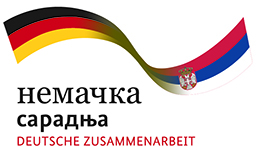The project “Reintegrate II – further support for sustainable (re)integration of returnees in Serbia” is aimed at strengthening the economic and psychosocial capacities of users primarily from the returning population, as well as the locally vulnerable population. Additionally, through the institutional strengthening of the capacities of local self-governments in the territories of the Rasina, Raška, and Pirot districts where the project is being implemented, we seek to have a positive impact on the enhancement of the social protection system and the improvement of existing services.
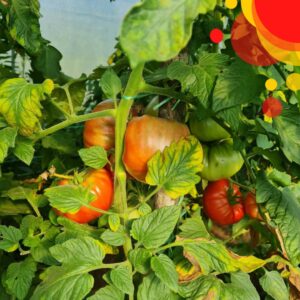

As part of our support in Pirot, Dimitrovgrad, and the surrounding areas, 15 greenhouses were distributed to beneficiaries who had previously undergone comprehensive business training for greenhouse production, as well as training in rural farm management. With expert guidance from educators and guidance throughout the production process from the project team, along with frequent field visits and production process checks, remarkable results were achieved in the first few months of planting.
One of the key elements of this project was the distribution of greenhouses, which proved to be an extremely efficient way to improve the economic situation of our beneficiaries. In conversations with the beneficiaries and during numerous site visits, the project team witnessed the significance that this form of support provides, both in terms of economic security and psychosocial support. Many beneficiaries gained the motivation to overcome their current circumstances and an added determination to improve their own situations.
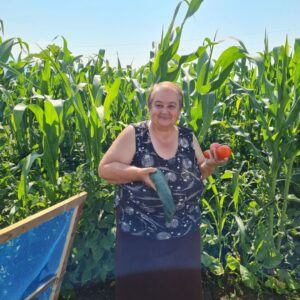
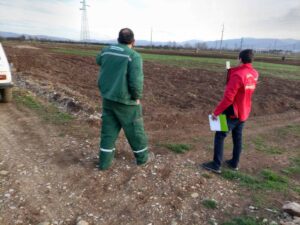
Slavica Nikolov from Dimitrovgrad says, “No matter how unbearably hot it gets in my greenhouse sometimes, this is a balm for my soul. I know that something good is being created by my own hands, and with my work, I will manage to save some money on the side. I get tired, but I know why I’m fighting, and believe me, I treasure each planting as something invaluable.”
Lidija Manić from Pirot adds, “We set up the greenhouse – there’s nothing nicer in the neighborhood! My grandfather and I, my husband, we handwove all the ties so they don’t cut the tender stems. We planted our old variety of peppers for ajvar, tomatoes, and cucumbers, and now we’re waiting – whatever God gives and the weather allows, that will be the yield. Our grandkids are far away, so when they come, we’ll have more to pack for them to take, and to try something healthy from the countryside – that’s what every grandma thinks, and so do I!”
To better determine the impact of support to the beneficiaries, we conducted an analysis that involved surveying beneficiaries from Pirot, Dimitrovgrad, and the surrounding areas by the project’s economic partner.
The analysis included 25 respondents out of a total of 30, and here are its results:
Gender Representation: We are very proud that 72% of greenhouse beneficiaries are women, while 28% of men are actively involved in greenhouse production. This gender ratio promotes inclusion and empowerment of women in rural areas.
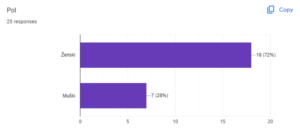
Regional Distribution: The greenhouses were evenly distributed among beneficiaries in Pirot and Dimitrovgrad, with the majority placed in suburban areas or villages belonging to the cities. This geographic coverage allows the benefits of greenhouse production to reach rural communities.
Product Diversity: Our beneficiaries have achieved remarkable diversity in greenhouse production. Tomatoes (92%) and peppers (88%) were the most common products, while a variety of fruits and vegetables contributed to the diversification of their production and increased income.
Impressive Yields: With an average yield of 460 kg of greenhouse products, our beneficiaries have demonstrated their ability and dedication to agriculture. Despite the drought, the average satisfaction rating with yields is 4.24.
Sustainable Income: The earnings from product sales so far have averaged 296 euros, and it is expected to increase to an average of 352 euros by the end of the season. These incomes represent an addition to the existing ones and support the economic stability of the families involved.
Local Sales: The majority of beneficiaries (88%) sold their products to neighbors and relatives. This local exchange is not only economically sustainable but also fosters community connections and preserves tradition.
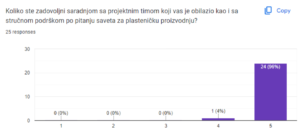
Collaboration and Support: The project team and the expert support provided during education and beneficiary visits received high ratings, with an average rating of 4.96. We made every effort to understand their needs and respond promptly to them.
Significance of Training: Training on greenhouse production and rural farm management conducted before the distribution of greenhouses received the highest ratings (5), indicating its great importance for the beneficiaries. In addition to the theoretical training on production, cultivation, and product marketing, the frequent visits by the project team and expert associates had a significant impact on the beneficiaries.
Future Plans: After the harvest of the current crops, the majority of beneficiaries (67%) plan to sow green vegetables. Their ability to plan for the future and consider new crops demonstrates their capacity for long-term successful management of their greenhouses. In further developing their production and achieving more stable incomes, 48% of the beneficiaries have expressed that a small tractor would be of great assistance to them.

These successes clearly demonstrate that small grants are extremely valuable for economic sustainability and family economic support because they enable a quick response to local needs and challenges. In this way, they directly impact the economic aspects of individuals and families, which is particularly important in communities facing socio-economic challenges and limited resources.
Furthermore, small grants support local initiative and entrepreneurship, enabling individuals to identify opportunities in their communities and leverage them to generate additional income. This is not only economically sustainable but also contributes to the development of local economies in Pirot, Dimitrovgrad, and the surrounding areas. Small grants bring about positive changes that are visible, measurable, and have long-term effects while empowering beneficiaries to recognize their strengths and capabilities.
After training and the setup of structures, we quickly achieve concrete and visible results in supporting beneficiaries. These results are equally the product of the efforts of beneficiaries and a thorough analysis and a proper understanding of their needs, as well as market demands.
Our goal is for this success story to serve as inspiration for other communities and organizations that can recognize the value of small grants and their potential to create economic stability. The Reintegrate II project has not only succeeded in achieving its goals but has also changed the lives of our beneficiaries for the better.
